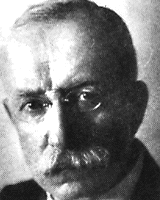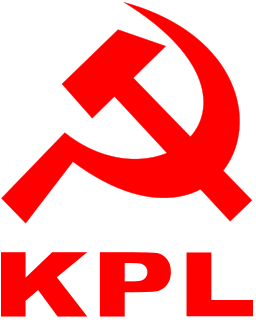The National Rally, until June 2018 known as the National Front, is a right-wing populist and nationalist political party in France. Most political commentators place the RN on the far-right, but other sources suggest that the party's position on the political spectrum has become more difficult to define clearly. Owing to the French electoral system, the party's representation in public office has been limited despite its significant share of the vote. Its major policies include opposition to French membership in NATO, European Union, the Schengen Area, and the Eurozone. As an anti-European Union party, the National Rally has opposed the European Union since its creation. The party also supports greater government intervention in the economy, protectionism, a zero tolerance approach to law and order, and significant cuts to legal immigration.

The Austrian People's Party is a conservative Christian-democratic political party in Austria. A successor to the Christian Social Party of the late 19th and early 20th centuries, it was founded immediately following the reestablishment of the Republic of Austria in 1945 and since then has been one of the two largest Austrian political parties with the Social Democratic Party of Austria (SPÖ). In federal governance, the ÖVP has spent most of the postwar era in a grand coalition with the SPÖ. Most recently, it has been junior partner in a coalition government with the SPÖ since 2007. However, the ÖVP won the 2017 election, having the greatest number of seats and formed a coalition with the far-right Freedom Party of Austria (FPÖ). Its chairman Sebastian Kurz is the youngest Chancellor in Austrian history.
Likud, officially the Likud-National Liberal Movement, is a centre-right to right-wing political party in Israel. A secular party, it was founded in 1973 by Menachem Begin and Ariel Sharon in an alliance with several right-wing parties. Likud's landslide victory in the 1977 elections was a major turning point in the country's political history, marking the first time the left had lost power. In addition, it was the first time in Israel that a right-wing party won the plurality of the votes. However, after ruling the country for most of the 1980s, the party lost the Knesset election in 1992. Nevertheless, Likud's candidate Benjamin Netanyahu did win the vote for Prime Minister in 1996 and was given the task of forming a government after the 1996 elections. Netanyahu's government fell apart after a vote of no confidence, which led to elections being called in 1999 and Likud losing power to the One Israel coalition led by Ehud Barak.

The UK Independence Party is a hard Eurosceptic, right-wing political party in the United Kingdom. It currently has one representative in the House of Lords and seven Members of the European Parliament (MEPs). It has three Assembly Members (AMs) in the National Assembly for Wales and one member in the London Assembly. The party reached its greatest level of success in the mid-2010s, when it gained two Members of Parliament and was the largest UK party in the European Parliament.

Arthur Hoffmann was a Swiss politician and member of the Swiss Federal Council (1911–1917).

The Left is a democratic socialist political party in Luxembourg.

The Rally of the French People was a French political party, led by Charles de Gaulle.
Francis Arnold Hoffmann was a Lutheran clergyman, politician and writer.

The Communist Party of Luxembourg, abbreviated to KPL or PCL, is a communist party in Luxembourg.
National conservatism is a variant of conservatism that concentrates more on national interests and upholding cultural or ethnic identity than most other conservatives. In Europe, national conservatives are usually Eurosceptics. National conservatism shares characteristics with traditionalist conservatism and social conservatism given how the three variations focus on preservation and tradition. As national conservatism seeks to preserve national interests, traditional conservatism emphasizes ancestral institutions and social conservatism. National-conservative parties often have roots in environments with a rural, traditionalist or peripheral basis, contrasting with the more urban support base of liberal-conservative parties.

Heinrich Hoffmann was Adolf Hitler's official photographer, and a Nazi politician and publisher, who was a member of Hitler's intimate circle. Hoffmann's photographs were a significant part of Hitler's propaganda campaign to present himself and the Nazi Party as a significant mass phenomenon. He received royalties from all uses of Hitler's image, even on postage stamps, which made him a millionaire over the course of Hitler's reign. After the Second World War he was tried and sentenced to four years in prison for war profiteering. He was classified by the Allies' Art Looting Investigators to be a "major offender" in Nazi art plundering of Jews, as both art dealer and collector and his art collection, which contained many artworks looted from Jews, was ordered confiscated by the Allies. He recovered the art in 1956 by order of the Bavarian State.

Elections to the Swiss Federal Assembly, the federal parliament of Switzerland, were held on Sunday, 21 October 2007. In a few cantons, a second round of the elections to the Council of States was held on 11 November, 18 November, and 25 November 2007. For the 48th legislative term of the federal parliament (2007–2011), voters in 26 cantons elected all 200 members of the National Council as well as 43 out of 46 members of the Council of States. The other three members of the Council of States for that term of service were elected at an earlier date.
Right-wing populism is a political ideology which combines right-wing politics and populist rhetoric and themes. The rhetoric often consists of anti-elitist sentiments, opposition to the Establishment and speaking for the common people.
André Hoffmann is a Luxembourgish politician from the leftist The Left grouping, of which he is the leader. He was formerly leader of the Communist Party (KPL), but has remained as leader of the Left after the KPL left the alliance. He was a member of the Chamber of Deputies, but resigned in 2000 to become échevin of Esch-sur-Alzette, being replaced in the Chamber by Aloyse Bisdorff. He remained on Esch-sur-Alzette communal council until 2008, when he was replaced by Marc Baum to allow Hoffmann to concentrate on the 2009 election to the Chamber of Deputies.
Hubert Ney was a German politician and Minister President of Saarland (1956-1957). He was born and died in Saarlouis.
Frank Albert Hoffmann is an American state legislator who has represented District 15 in Ouachita Parish as a Republican member of the Louisiana House of Representatives since January 2008. He is known as a leading legislative opponent of abortion. Prior to his entry into politics, Hoffman was a retired school administrator for the Ouachita Parish School Board. He resides in West Monroe.

Alternative for Germany is a right-wing to far-right political party in Germany. Founded in April 2013, the AfD narrowly missed the 5% electoral threshold to sit in the Bundestag during the 2013 federal election. In 2014 the party won seven seats in the European election as a member of the European Conservatives and Reformists. After securing representation in 14 of the 16 German state parliaments by October 2017, the AfD became the third-largest party in Germany after the 2017 federal election, claiming 94 seats in the Bundestag, a major breakthrough for the party as it was the first time the AfD had won any seats in the Bundestag. The party is chaired by Jörg Meuthen; its lead candidates in the 2017 elections were AfD Co-Vice Chairman Alexander Gauland and Alice Weidel who now serves as the party group leader in the Bundestag. Since 2017, AfD is the largest opposition party in the Bundestag.

In politics, centrism—the centre or the center —is a political outlook or specific position that involves acceptance or support of a balance of a degree of social equality and a degree of social hierarchy, while opposing political changes which would result in a significant shift of society strongly to either the left or the right.

The 190th New York State Legislature, consisting of the New York State Senate and the New York State Assembly, met from January 6, 1993, to December 31, 1994, during the eleventh and twelfth years of Mario Cuomo's governorship, in Albany.
The Party of Farmers and the Middle Class was a political party in Luxembourg led by Eugène Hoffmann.












